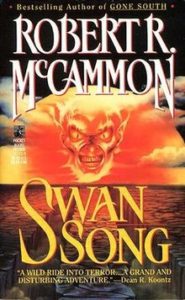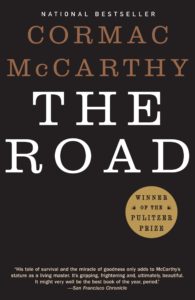A guide to writing apocalyptic fiction, from an author who lives there…
Doomsday stories have enthralled readers for centuries. For as long as we’ve understood our place in the world, we’ve told stories about how that world might end. That’s what drives many people to these stories in the first place — a curiosity about the nature of existence.
Writing apocalyptic fiction has its own appeal as well, especially for those writers who like to envision a world beyond our own. Writing within this genre gives you an opportunity to “wipe the slate” and rebuild society in the manner of your choosing.
But how do you go about it? How does a novice or aspiring writer tackle the daunting world of apocalyptic fiction? Here are some writing tips and story strategies to help you reach the finish line.
Common Types of Apocalyptic Fiction
In a separate blog post, I went over some of the most common doomsday scenarios used in fiction. Here’s a quick A-to-Z recap of those scenarios:
- Alien Invasion: Advanced beings from another planet attack and annihilate our civilizations.
- Astronomical Catastrophe: A giant asteroid or comet, a burst of gamma rays, or some other cosmic force wipes out much of the planet’s population.
- Disease / Pandemic / Outbreak: A deadly and highly contagious pathogen emerges and pushes humanity to the brink of extinction.
- Environmental Catastrophe: Climate change and sea level rise make much of the planet uninhabitable. Massive plant death causes our food system to collapse. Et cetera.
- Machine, Robot or AI Uprising: A futuristic “Frankenstein’s monster” scenario, in which our own creations rise up against us. (Think Terminator, Westworld and Robopocalypse.)
- Natural Disaster: An unprecedented seismic event causes all of the world’s volcanoes to erupt in unison. A new kind of “acid rain” sweeps the planet, destroying most plant life. Inexplicable fires scorch the planet. Et cetera.
- Nuclear Holocaust: There’s really no need to describe this one, is there?
- Reproductive Failure: Environmental change or a virulent pathogen causes global infertility, starting a countdown to extinction for humankind (as in The Children of Men, by P.D. James).
- Zombies: The dead rise and walk again, creating more of their kind along the way. Chaos ensues.
When writing apocalyptic fiction, you must first choose a type of apocalypse. How will society end in your story? What kind of catastrophe will you describe? Something from the list above? Or something entirely new?
Creating Something New Within the Genre
Writing apocalyptic fiction gives you endless creative freedom. With a bit of imagination, you could come up with something people haven’t seen before. Something fresh and original.
Here’s an example. In his unsettling novel Bird Box, Josh Malerman created a post-apocalyptic world where people are driven mad just by seeing “something” outside. We don’t know what that something is, and that’s partly what makes this story work. It’s fresh and original. It brings an element of mystery to the apocalyptic fiction genre.
What can you envision? What kind of civilization-ending “thing” can you dream up? Close your eyes. Turn off your internal critic. Let your thoughts travel. See what you find out there, lurking in the dark. Harness it. Deliver it to us with clarity and force.
Need more inspiration or ideas? Check out this informative but chilling study on the collapse of civilization, by researcher and author Luke Kemp.
Where to Start Writing: Before, During or After
When writing apocalyptic fiction, you could start your story before, during or after the catastrophic event(s). Only you can determine which option is right for you. It really depends on what kind of story you want to tell, and what kinds of stories you like to read.
If you’re writing a dystopia-style novel, where a new and harsh world order has been established, you’ll probably want to start your story after the apocalyptic event. This allows you to spend more time in the dystopia you’ve created, which is the real story.
If you’re writing an apocalyptic horror novel, you could start before, during or after the “event.” Again, it depends on what kind of story you want to tell.
From a fiction-writing standpoint, there are advantages to both options:
- Pre-apocalypse: By starting your story before the apocalyptic event unfolds, you can depict the sharp contrast between normality and upheaval. The reader gets to see the apocalypse unfolding and society collapsing. They go along for the ride. You can show us how your characters change during those trying times, and what they’re made of.
- Post-apocalypse: Starting after the apocalyptic event has occurred plunges the reader into a new and unfamiliar world from the first chapter. It might be less thrilling than the “pre-apocalypse” starting point mentioned above, but it serves other purposes. This approach to apocalyptic fiction writing gives you more freedom, in terms of world-building. You’re not limited to what the world was before.
Think about the kind of story you want to tell, and the “new” world you want to create. Think about the challenges you want your characters to face. If you do that, the question of where to start writing your apocalyptic tale should answer itself.
Examples from Two Popular Novels

Let’s look at some examples of novels that start before and after the apocalyptic events, and how those differences shape the stories:
In Swan Song, the Bram Stoker Award-winning novel by Robert McCammon, the story begins just as the world is hurtling toward an all-out nuclear exchange. We are with the main characters when this occurs. We go along for the ride, and it’s truly terrifying.
After the missiles and bombs have fallen, the story shifts into post-apocalyptic mode. By starting his tale before the apocalypse, McCammon created a broader story that’s epic in scope. We see the horrors of a nuclear war unfolding, along with its harrowing aftermath.

In The Road, the Pulitzer Prize-wining novel by Cormac McCarthy, the story begins after an apocalyptic event has literally scorched the earth. McCarthy provides a few flashbacks, via the main character, but they offer scant details about the nature of the event.
He makes the apocalypse a mystery, allowing us to focus on “the man” and “the boy” as they navigate the post-apocalyptic landscape. It’s a narrower scope when compared to Swan Song, but deeper in a human sense.
These authors had clear goals about what they wanted to accomplish when writing apocalyptic fiction, so they choose the best starting point to support those goals. They framed their stories around their objectives.
Which model works best for you? Which one are you drawn toward?
World-Building Possibilities in Apocalyptic Fiction
What will the world be like, once your fictional apocalypse unleashes its fury? What will people be like? How will they live? Will there be any kind of social structure remaining, like clans or villages? Or will humanity be reduced to a kind of nomadic existence, with bandits prowling the landscape?
There are a lot of questions that need answers when writing apocalyptic fiction. The good news is, there’s no right or wrong answer to any of them. You, as the writer, get to determine those things. You get to create your own unique vision. And that’s part of the thrill of writing these types of stories.
Consider the difference:
- In literary and non-genre fiction, the writer gets to create characters and put them into unique situations. But those situations usually take place in a world we recognize. There is little to no world-building potential in non-genre literary and mainstream fiction.
- In apocalyptic fiction, the writer gets to create a whole new world order. She can erase the scoreboard and restart the game, with a totally new set of rules, conditions and circumstances.
Writing apocalyptic fiction gives you more creative freedom. Not all writers are up to this challenge. It’s a daunting task, creating a new-world vision. But for certain writers, this genre scratches a certain itch. It satisfies a creative yearning.
Related: 7 Tips and Strategies for World Building
Challenging Your Characters With Obstacles
Fiction forces characters into challenging situations. Those are the building blocks of any good story. The protagonist sets out on a quest but encounters a series of challenges. It is through these challenges (and the suffering they produce) that your character changes and grows during the course of the story.
With apocalyptic fiction, the primary obstacles are somewhat obvious:
- Holy crap, the world has ended!
- Where do we get food and water?
- How do we survive another day?
- I don’t like the looks of those strangers.
And then you have the more subtle obstacles like interpersonal conflict, moral dilemmas, fear, etc. These obstacles will draw out your characters, testing them in ways they’ve never been tested before.
You have a lot of ways to make your characters suffer when writing apocalyptic fiction. And it’s important they do suffer. That might sound sadistic, but it’s really just good storytelling. That’s what readers expect.
One of the reasons we read fiction is to see characters pushed to their limits, emotionally and physically. Went want to see them adapt to challenges and come out stronger in the end.
Most humans are empathetic by nature. When we see another person in pain, even a stranger, we feel something for them. We want to ease their pain. But as an author, you can’t let your empathy for real people stop you from pushing your characters. If you want to tell a good story, you’ll have to create some suffering for your characters. That’s how fiction works.
So there you have them, a few tips and ideas for writing apocalyptic fiction that grips readers from start to finish. I hope you found this article helpful and wish you well in your writing journey.
